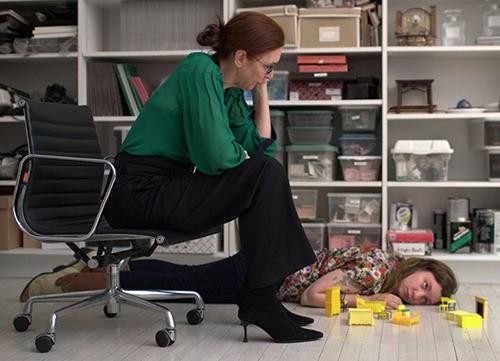Nominated by the Gotham Awards for Best Ensemble Cast and Breakthrough Director; by the Independent Spirit Awards for Best Cinematography, Best First Feature and Best First Screenplay; oh, and won the Best Narrative Feature award at the 2010 SXSW Film Festival. Brush that dirt off your shoulder, Lena Dunham.
Take the awards and nominations as a confirmation that a damn good film is out there in the universe, but what should really get you fired up is how appropriate “”Tiny Furniture”” is for our generation. We are Aura; we are (or soon will be) the 20-something young adult, posting up in our parents’ home, fuddling around pants-less, eating their food and wasting our time — a skin-sack of organs with nothing to say for ourselves besides, “”I graduated college. I have a degree in something.”” As though, if we keep saying the magic mantra, the hidden door leading to the rest of our lives will reveal itself to us and we can go on our merry way with a purpose, with a plan.
Dunham, a director, writer and actor at 24, understands this post-grad ennui. She uses this to propel her art, and slaps our faces with the reality of how sweetly stupid we will look in her shoes. But that is life; that is the next, inevitable step; and that is what makes this movie remarkable.
“”Tiny Furniture”” is brutally authentic, detailing every banal second of Aura’s post-college days at home — an endeavor that, though well-done, can seem a little too drawn out for a film of 98 minutes. However, Dunham pairs this candor with fantastically witty dialogue that keeps the plot from giving out in its weaker moments.
So we watch as Aura squeezes into her former life with the same bashful tug and stubborn denial of squeezing into a high school sweater that hasn’t fit since, well, high school. Squirm into bed with a begrudging mother, pick up a job worthy of a degree — or as a hostess — futz around with your wild mess of a childhood best friend (Charlotte, played by Jemima Kirke, who is a deliciously addictive character), record yourself reading from your mother’s old journals (later to be posted on YouTube), and dally with boys you should not try to date, but will anyway. Bring them home. Whatever prolongs the question: What next?
And as Aura slumps further into her former life, abandoning college ties and settling into a state of do-nothing placation dusted with not-so-smart decisions, the strings supporting her existence become tense, fraught and frayed — but only subtly so. This is supposed to mirror real life, after all. The audience will wait for the snap, the collapse, and wonder what hope could possibly lurk under such lackluster aftermath.
Dunham uses her real sister (Nadine/Grace Dunham) and mother (Siri/photographer of miniatures, Laurie Simmons) as her on-screen familial unit — an unconventional, but clever choice, making for a quirky daughter-mother-daughter love triangle. That is “”Tiny Furniture”” — quirky, unconventional and very, very clever.









